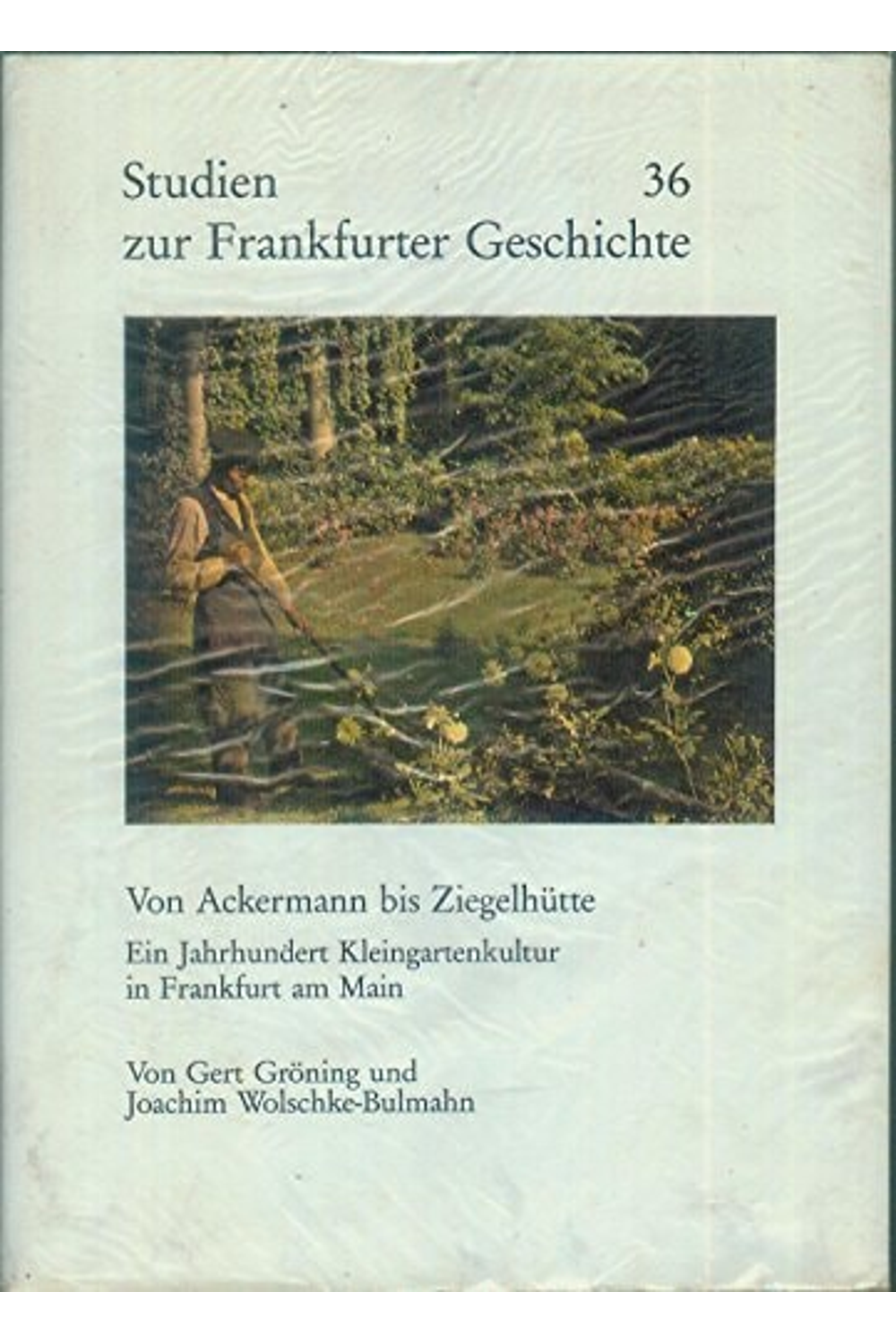Explore a century of Frankfurt’s urban garden culture with “Von Ackermenn bis Ziegelhtte” by Gert Grning. This German-language hardcover, part of the “Studien zur Frankfurter Geschichte” series, delves into the history and social impact of allotment gardens (Kleingrten) in Frankfurt am Main from 1895 to 1995. Grning examines how these gardens provided crucial green spaces, food sources, and a sense of community for city dwellers, particularly the working class. Discover how the Kleingrten adapted and played a vital role during periods of war, economic hardship, and rapid urbanization, shaping Frankfurt’s unique identity. This book is a valuable resource for anyone interested in German urban history, landscape architecture, and the cultural significance of allotment gardens. Published by W. Kramer, this 311-page study offers insightful perspectives on German social life and environmental planning within an urban context. Ideal for researchers and anyone fascinated by the history of Frankfurt and the “Kleingarten” movement.
Von Ackermenn bis Ziegelhutte: Ein Jahrhundert Kleingartenkultur in Frankfurt am Main (Studien zur Frankfurter Geschichte) (German Edition)
14,78 $
In stock
Description
Text: German
Discover a fascinating slice of German history and urban life with "Von Ackermenn bis Ziegelhtte: Ein Jahrhundert Kleingartenkultur in Frankfurt am Main (Studien zur Frankfurter Geschichte)" by Gert Grning. This meticulously researched hardcover book, published in 1995 by W. Kramer, delves into the captivating world of allotment gardens ("Kleingrten") in Frankfurt am Main over the course of a century. A vital part of German urban culture, these small garden plots have served as oases of green for city dwellers, providing not only fresh produce and a connection to nature but also a sense of community and social interaction. Gert Grning, an established scholar in the field of landscape architecture and environmental planning, brings a wealth of expertise to this in-depth study. He doesn't simply present a historical account; he weaves together threads of social history, urban development, and cultural practices to paint a vivid picture of how these gardens have shaped and been shaped by the city of Frankfurt. This book goes beyond mere descriptions of plants and vegetables. It explores the origins of the allotment garden movement, its evolution through various historical periods (including the two World Wars and the post-war reconstruction), and its ongoing significance in contemporary urban life. Grning examines the regulations and policies that governed these gardens, the social dynamics among the gardeners, and the architectural styles of the garden sheds ("Lauben") that dotted the landscape. Specifically, "Von Ackermenn bis Ziegelhtte" investigates how the "Kleingrten" offered Frankfurt's working class a means of supplementing their diets, escaping the often cramped and polluted conditions of the city, and building a sense of ownership and belonging. It reveals how these gardens fostered a unique subculture, with its own traditions, rituals, and social hierarchies. The book may reveal how world events and economic circumstances shaped the role these small gardens played in the lives of Frankfurters. For example, during times of scarcity, the food produced in these gardens became a vital source of sustenance. This "Studien zur Frankfurter Geschichte" volume is a valuable resource for anyone interested in German history, urban studies, landscape architecture, or social history. Although written in German, its comprehensive research and insightful analysis make it an indispensable addition to any serious collection on the history of Frankfurt am Main and the enduring legacy of the German "Kleingarten" movement. Measuring approximately 4000g and spanning 311 pages, this substantial hardcover provides a detailed and nuanced exploration of a fascinating aspect of German urban life. It offers a unique perspective on how people create community and connect with nature within the context of a rapidly changing city. This book is a fascinating exploration of Frankfurt's history through an unusual but captivating lens.
Additional information
| Authors | |
|---|---|
| Binding | |
| Condition | |
| ISBN-10 | 3782904524 |
| ISBN-13 | 9783782904520 |
| Language | |
| Pages | 311 |
| Publisher | |
| Year published | |
| Weight | 4000 |
SKU: G-9783782904520-3
Categories: Foreign Language Study & Reference, Reference
Related products
-
De Coeur inconnu
13,15 $ -
Children’s Illustrated Thesaurus
15,16 $ -
The Great Jimbo James (Solos)
13,15 $
- Additional information
- Currencies
- USD – United States dollar
- EUR – Euro
- GBP – Pound sterling
- CNY – Chinese yuan
- BRL – Brazilian real
- MXN – Mexican peso
- JPY – Japanese yen
- PHP – Philippine peso
- THB – Thai baht
- PLN – Polish złoty
- CAD – Canadian dollar
- MYR – Malaysian ringgit
- AUD – Australian dollar
- TWD – New Taiwan dollar
- CZK – Czech koruna
- SEK – Swedish krona
- HUF – Hungarian forint
- ILS – Israeli new shekel
- CHF – Swiss franc
- HKD – Hong Kong dollar
- DKK – Danish krone
- SGD – Singapore dollar
- NOK – Norwegian krone
- NZD – New Zealand dollar





